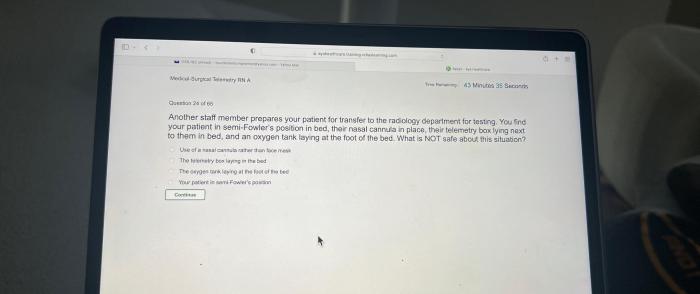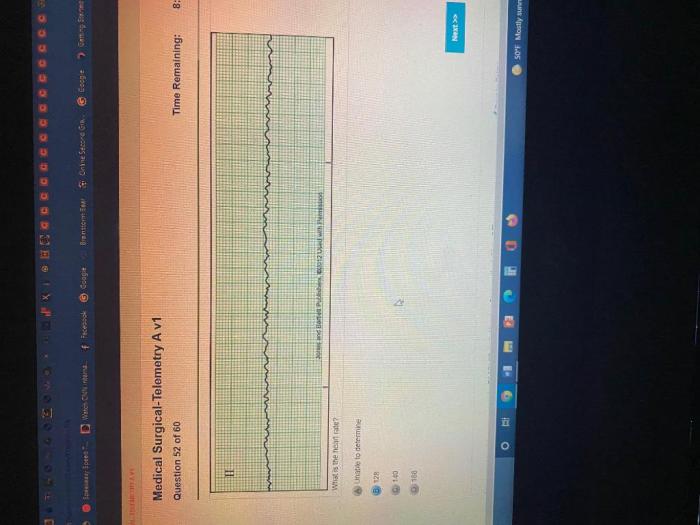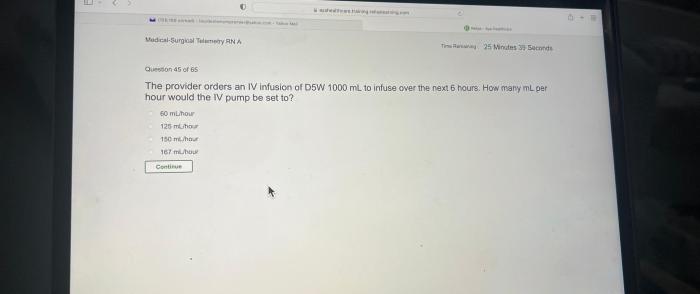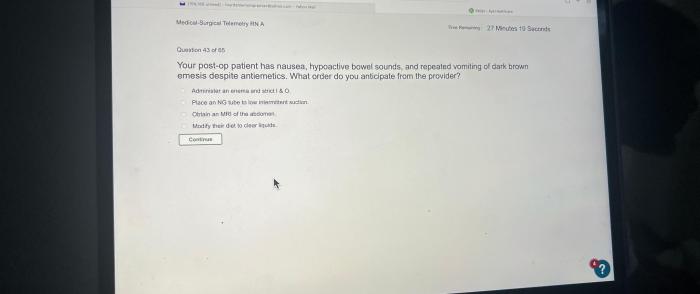Medical-surgical telemetry rn a relias – Medical-surgical telemetry RNs play a crucial role in the monitoring and care of patients in medical-surgical settings. Telemetry systems allow nurses to monitor patients’ vital signs remotely, enabling early detection of changes in their condition and timely intervention. This article explores the purpose, functionality, and benefits of telemetry monitoring, the responsibilities of medical-surgical telemetry RNs, and the importance of patient education and communication in telemetry care.
Medical-Surgical Telemetry RN: A Comprehensive Overview

Telemetry systems are crucial in modern healthcare settings, providing real-time monitoring of physiological parameters. They enhance patient care by enabling early detection of abnormalities and facilitating timely interventions. This article aims to provide a comprehensive overview of medical-surgical telemetry RNs, encompassing their responsibilities, the telemetry system’s functionality, and the significance of patient education and communication.
Telemetry System
A telemetry system consists of sensors, transmitters, receivers, and monitors. Sensors are attached to the patient’s body and collect data on various physiological parameters, such as heart rate, blood pressure, and respiratory rate. This data is transmitted wirelessly to a receiver, which then relays it to a monitor.
The monitor displays the data in real-time, allowing healthcare professionals to continuously assess the patient’s condition.
Telemetry Monitoring
Telemetry monitoring offers numerous advantages over traditional bedside monitoring. It allows for continuous monitoring, which increases the likelihood of detecting abnormalities early on. It also reduces the need for physical assessments, minimizing interruptions and discomfort for the patient. Additionally, telemetry monitoring enables remote monitoring, allowing healthcare professionals to monitor patients from a central location.
Role of the Medical-Surgical Telemetry RN
Medical-surgical telemetry RNs play a vital role in patient care. Their responsibilities include assessing patients, monitoring telemetry data, and intervening as needed. They are trained to recognize abnormal patterns and respond promptly, ensuring the patient’s well-being.
Patient Education and Communication
Effective patient education and communication are essential in telemetry care. Telemetry RNs must provide clear explanations about the telemetry system, its purpose, and the implications of the monitored parameters. They should encourage patients to ask questions and express concerns, fostering a collaborative and informed healthcare experience.
Documentation and Reporting, Medical-surgical telemetry rn a relias
Telemetry nurses are responsible for documenting and reporting patient data accurately and thoroughly. This includes recording vital signs, monitoring trends, and noting any interventions performed. Proper documentation ensures continuity of care and facilitates effective communication among healthcare professionals.
Quality Improvement and Safety
Telemetry nurses play a crucial role in quality improvement and patient safety initiatives. They can analyze telemetry data to identify potential safety concerns, such as arrhythmias or changes in vital signs. By promptly addressing these concerns, they contribute to the overall safety and well-being of patients.
FAQ Corner: Medical-surgical Telemetry Rn A Relias
What is the purpose of a telemetry system in a medical-surgical setting?
Telemetry systems allow nurses to monitor patients’ vital signs remotely, enabling early detection of changes in their condition and timely intervention.
What are the advantages of telemetry monitoring compared to traditional bedside monitoring?
Telemetry monitoring allows for continuous monitoring of patients’ vital signs, enabling early detection of changes in their condition and timely intervention. It also reduces the need for nurses to be physically present at the bedside, allowing them to spend more time providing direct care to patients.
What are the responsibilities of a medical-surgical telemetry RN?
Medical-surgical telemetry RNs are responsible for monitoring patients’ vital signs, assessing their condition, and intervening as needed. They also provide patient education and communication, and document and report on patients’ progress.


